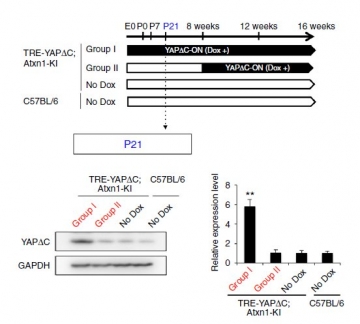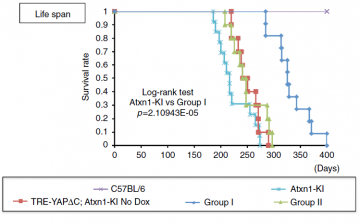Preclinical pathology during development affects the post-onset adulthood symptoms in spinocerebellar ataxia type 1 (2017)
Spinocerebellar ataxia type1 (SCA1) is one of the major models of neurodegenerative disease. At the same as other neurodegenerative diseases such as Alzheimer’s disease (AD), Parkinson’s disease (PD) and amyotrophic lateral sclerosis (ALS), disease modifying therapy for SCA1 has not developed. Although a lot of knowledge for pathology caused by mutation has also been accumulated, it has not been clear neither when it occurs, what it is, nor how to treat it. For instance, in context of therapeutic strategies of AD, there were many clinical investigations to remove amyloid-beta, however, clinical symptoms did not improve or stop the progression despite elimination of amyloid-beta. This fact tells us that it is quite important to uncover that when irreversible pathology of neurodegenerative diseases occurs and what the pathology is.
In our previous study, we studied about the effect of stage-specific expression of YAPdeltaC to symptoms of SCA1 model mice (Ataxin-1 knock-in mice) and their survival time using our newly developed Tet-ON YAPdeltaC system in Atxn1-KI mice. As a result, expression of YAPdeltaC from embryo stage to 8 weeks after birth made significant improvement of symptoms and survival duration, however, almost no effect found with expression of YAPdeltaC after 8 weeks.
Moreover, we revealed that YAPdeltaC works collaboratively with normal Ataxin1 as transcriptional coactivator enhancing RORalpha, that plays a role of regulation of gene expression in cerebellar neurons at developmental stage. Because mutant Ataxin1 deprives YAPdeltaC from RORalpha, it inhibits expressions of genes necessary for maturation of cerebellar neurons. We also found that forcible expression of YAPdeltaC increases its binding of RORalpha and that makes a recovery of gene expressions required to mature cerebellar neurons.
Moreover, we revealed that YAPdeltaC works collaboratively with normal Ataxin1 as transcriptional coactivator enhancing RORalpha, that plays a role of regulation of gene expression in cerebellar neurons at developmental stage. Because mutant Ataxin1 deprives YAPdeltaC from RORalpha, it inhibits expressions of genes necessary for maturation of cerebellar neurons. We also found that forcible expression of YAPdeltaC increases its binding of RORalpha and that makes a recovery of gene expressions required to mature cerebellar neurons.


Clinical studies to examine candidate drugs by starting the clinical trial before onset are now undergoing in USA, and are also planned in Japan. Our study showed that recovery of gene expressions required for maturation of cerebellar neurons in developmental stage improves clinical symptoms of SCA1 model mice in adulthood. Because genetic diagnosis can be available for SCA1 patients, it could be possible to develop prophylactic or disease modifying therapy in the future by increasing amount of YAPdeltaC at preclinical stage. This study presented a great example that preclinical therapy was needed for neurodegenerative diseases commonly, not only for AD. At the same time, it has great significance that revealed its therapeutic target molecule.

